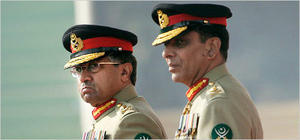Pakistan puzzleAl Qaeda cellphone shows possible link to Pakistani Intelligence
The latest details to emerge from the data seized by Navy SEALs from the raid that killed Osama bin Laden reveal that al Qaeda may have links to a Pakistani militant group that has close ties to Pakistan’s intelligence agency; analysts found that the cell phone of Osama bin Laden’s courier contained contacts to Harakat-ul-Mujahedeen, a militant group originally set up with the assistance of Pakistan’s Directorate for Interservices Intelligence (ISI) to fight as a proxy in Afghanistan

Lt. Gen. Ahmad Shuja Pasha (right), head of the ISI // Source: blogspot.com
The latest details to emerge from the data seized by Navy SEALs from the raid that killed Osama bin Laden reveal that al Qaeda may have links to a Pakistani militant group that has close ties to Pakistan’s intelligence agency.
According to senior American officials speaking anonymously to the New York Times, intelligence analysts found that the cell phone of Osama bin Laden’s courier contained contacts to Harakat-ul-Mujahedeen, a militant group originally set up with the assistance of Pakistan’s Directorate for Interservices Intelligence (ISI) to fight as a proxy in Afghanistan.
The latest information helps explain how Osama bin Laden was able to hide in Abbottabad for so long, a town crawling with Pakistani military officials and just three hours from the country’s capital.
Harakat has a deep network across Pakistan, especially in Abbottabad, which could have allowed bin Laden to live and operate throughout the country. The group has strong ties with both al Qaeda and the ISI, allowing them to roam freely across the country.
Calls from bin Laden’s courier’s phone were placed to Harakat commanders in South Waziristan where al Qaeda operatives had based their operations. Analysts believe that it is possible that Harakat could have issued orders, passed messages, or distributed resources on behalf of bin Laden to al Qaeda’s network of operatives throughout Pakistan’s tribal areas.
Bruce Riedel, a former CIA officer, said, Harakat “is one of the oldest and closest allies of Al Qaeda, and they are very, very close to the ISI.”
Intelligence analysts traced the calls made on the cell phone and learned that Harakat commanders had called and even met with Pakistani intelligence officials, but officials were careful to note that there was no direct evidence to indicate that ISI had knowingly sheltered bin Laden.
Officials said the calls were not a “smoking gun,” but did provide a valuable lead into how bin Laden was able to evade U.S. forces for so long.
“It’s a serious lead,” said one American official. “It’s an avenue we’re investigating.”
The evidence does not bode well for U.S.-Pakistani relations, which have been strained following the bin Laden raid American officials long suspected that elements of Pakistan’s intelligence agency had been assisting al Qaeda and were potentially even harboring him.
“The question of ISI and Pakistani Army complicity in Bin Laden’s hide-out now hangs like a dark cloud over the entire relationship” between Pakistan and the United States Riedel said.
